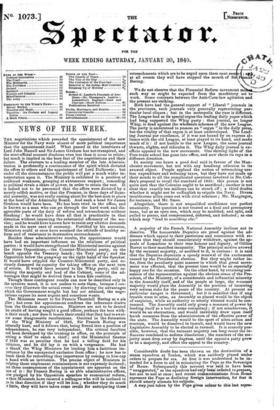NEWS OF THE WEEK.
'NE negotiations which preceded the appointment of the new Minister for the Navy were almost of more political importance than the appointment itself. What passed at the interviews of Lord John Russell and Sir James Graham has not transpired, and the semi-official account discloses even less than it seems to relate; but much is implied in the bare fact of the negotiations and their failure. The overture to a leading member of the late Adminis- tration is professedly a continuance of the spirit which dictated the offers to others and the appointment of Lord Dalhousie; but under all the circumstances the public will put a much wider in- terpretation upon it. The Ministry is exhibited in a position of confessed weakness, grasping at extraneous support ; conceding to political rivals a share of power, in order to retain the rest. It is indeed not to be presumed that the offers were dictated by a merely selfish motive, or that the Premier, in these days of finan- cial austerity, was not really casting about for the best man to place at the head of the Admiralty Board. And such a head Sir James Graham would have been. He has been tried in the office, and is known as a man who can go through the hard work and dis- agreeable parts of the duty of reform and retrenchment without flinching : he would have done all that is practicable in that direction without impairing the substantial efficiency of the ser- vice; and he would have known bow to resist any ulterior demands made in the mere cant of economy. Fortified by his accession, Ministers could at once have assumed the attitude of healthy re- form and of resistance to destructive encroachment.
Besides these administrative results, the appointment would have had an important influence on the relations of political parties : it would have strengthened the Ministerial section against the three Oppositions,—the Counter-Ministerial party, on the bench opposite the Treasury bench ; the Tory party ; and the Opposition below the gangway on the right hand of the Speaker. It would have crippled the Counter-Ministerial party, and se- riously damaged its capacity for taking office on the next turn of events. It would have secured to the Whig party, still re- taining the majority and lead of the Cabinet, some of the ad- vantages that might be derived from a bona fide coalition.
Though these contingent results can now be described only in the optative mood, it is not useless to note them, because e eon- oerso they illustrate the actual event : by showing the advantages which the Government sought but has not attained, the nego- dations expose its most urgent and conscious wants. The Ministers resort to Sir Francis Thornhill Baring as a pis slier ; but even his appointment confirms the inferences drawn From the Graham negotiations. Ministers are not to be denied le credit of having sought a good officer, perhaps the best with-
n their reach ; nor does it lessen their credit that they had to swal-
'ow some disagreeable recollections. Omitted in the formation )f the Whig Ministry of 1846, Sir Francis Baring was iaturally hurt, and it follows that, being forced into a position of ndependence, be was very independent. His critical faculties lad been developed by the training in office, on the principle of letting a thief to catch a thief ; and the Ministerial finance if 1848 was so peculiar that he had a telling field for his :riticism, and he did lay it on with a vengeance. He had
thank the Whig Ministers for lending him a factitious im- iortance by the unexpected exclusion from office ; he now has to hank them for redoubling that importance by coming to him cap a hand with an invitation. The precise object of Ministers in ;ulping these unpleasant reminiscences is not expressly declared; lut three consequences of the appointment are apparent on the i 'ace of it : Sir Francis Baring s an able administrative officer, low pledged by his Opposition speeches to economical reform, o that Ministers have secured a colleague who will be inclined to ;o in that direction if they will let him ; whether they do much r little, they will have taken some credit for anticipating those
retrenchments which are to be urged upon them next seas . at all events they will have stopped the mouth of Si Baring.


























